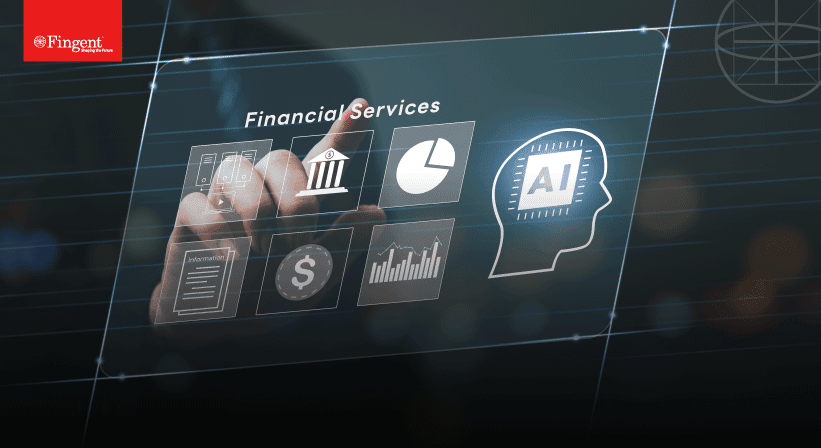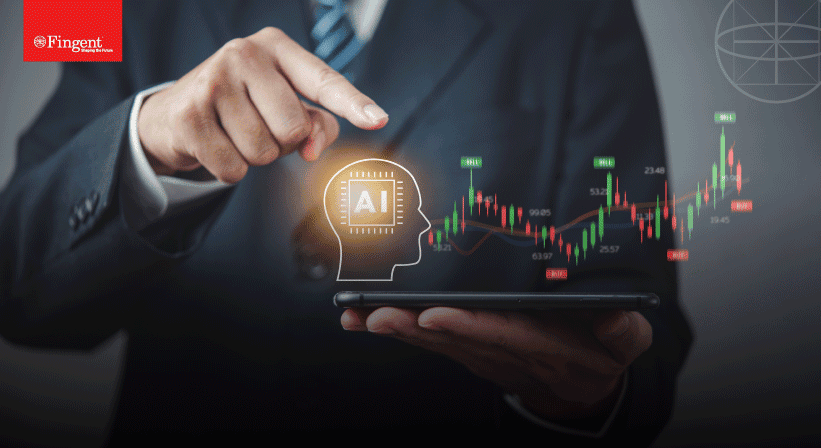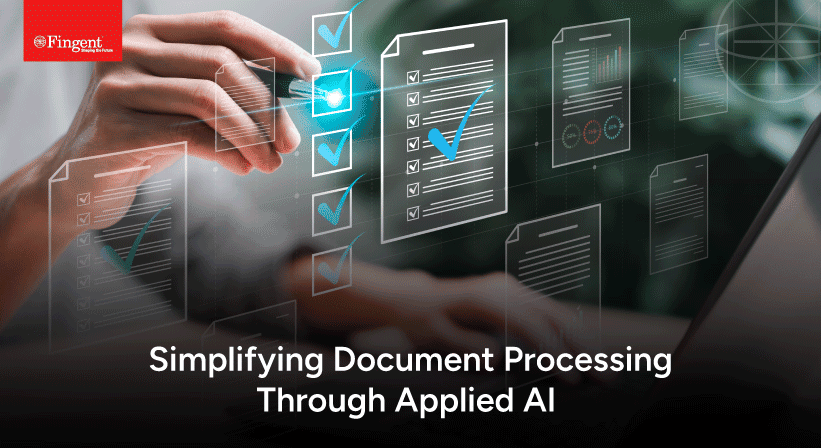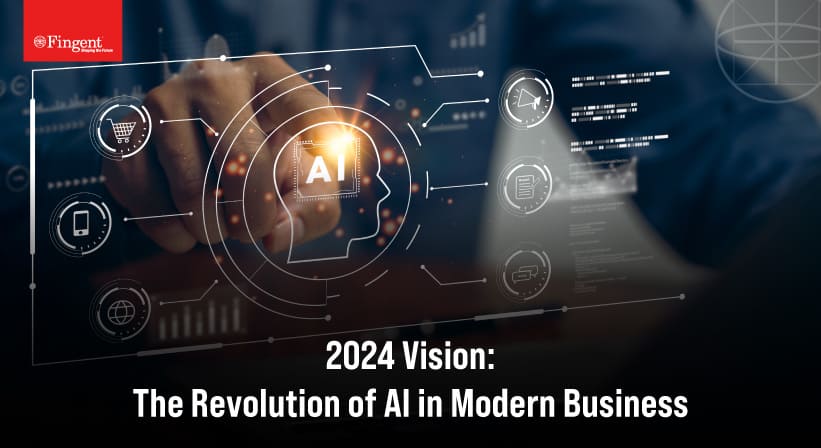Stepping The AI Revolution with Applied AI
“I am telling you, the world’s first ‘trillionaires’ are going to come from somebody who masters AI and all its derivatives and applies it in ways we never thought of.” – Mark Cuban.
It is surprising to see how much technology has evolved and the great impact that Artificial Intelligence has on this dramatic growth. During times of great evolution, it becomes vital to swiftly adapt to the change. Otherwise, you will find yourself lost in a sea of unfamiliarity.
Today, we see the practical application of AI in almost every realm. From solving real-world problems to achieving specific goals, AI is utilized in both general applications and business-specific applications. The rising capabilities of AI are allowing industries to embark on new horizons with quick data analysis and predictions, automated processes, improved efficiency, personalized experiences, and enhanced decision-making skills. And with Applied AI, these opportunities widen further. Applied AI leverages both software applications and machine learning to deliver high value in addressing practical challenges.
This blog will guide you through the business benefits of utilizing Applied AI.
What Is Artificial Intelligence?
Before we dive into what Applied Artificial Intelligence is and how it can help businesses prosper, let us first familiarize ourselves with AI.
Artificial intelligence (AI), a broad field of computer science, aims to create intelligent machines that can carry out tasks that normally call for human cognition.
Today, AI technology is used on approximately 77% of devices!
Artificial Intelligence is bringing about a paradigm shift in almost every area of the tech industry using a variety of techniques, particularly with regard to advances in machine learning and deep learning. It is having a growing impact on all industries, including healthcare, automotive, agriculture, hospitality, manufacturing, and education. Organizations are using this technology to become more efficient, cut expenses, enhance customer satisfaction, raise sales, and obtain a competitive edge in the market.
What Is Applied Artificial Intelligence?
Now that we have a base-level understanding of Artificial Intelligence let’s explore the world of Applied Artificial Intelligence.
Artificial intelligence (AI) that is applied to real-world situations allows computers and robots with computer control to perform activities that are currently only possible in lab settings. Advanced information processing, or “applied AI,” tries to create commercially viable “smart” systems, such as stock trading and “expert” medical diagnosis systems. In addition to changing how we interact with everything around us, applied Artificial Intelligence is contextualizing business models and industry processes.
As more companies begin to realize the potential of applied Artificial Intelligence, it’s becoming apparent that this is the way of the future. Applied artificial intelligence (AI) is quickly rising to the top of the global technology demand curve due to its capacity to automate mundane tasks, lower operating costs, and produce more robust and accurate data.
By applying AI techniques to solve real-world issues, including deep learning, computer vision, machine learning, and natural language processing (NLP), Applied AI systems function in actual settings and do jobs that would normally call for human assistance or knowledge. Although this application of Artificial Intelligence is relatively new, it is predicted to segue into routine business functions and dramatically improve them.
Ready To Transform Your Business Operations with AI?
How Is Applied AI Different From Regular Artificial Intelligence Applications?
Applied Artificial Intelligence is the practical application of Artificial Intelligence technologies to solve particular problems or carry out specific tasks, whereas Artificial Intelligence applications refer to specific software programs or systems that make use of AI techniques to perform tasks or functions. Applied AI entails applying AI theories, models, and algorithms to practical situations in order to produce observable results.
In contrast to conventional Artificial Intelligence technology, Applied AI operates well without an extensive amount of data. This makes it more accurate and efficient since it can operate with less data. Additionally, the AI can adjust without the need for manual coding or a protracted learning curve.
Moreover, applied AI is distinct from other Artificial Intelligence applications in that it integrates deep learning, robotics, computer vision, machine learning, and natural language processing to facilitate automated decision-making. Rather than depending on just one technology, this mix enables the AI to process more data and come to better conclusions. Applied AI is also flexible enough to be utilized in more dynamic scenarios because it can adjust to shifting environments and conditions.
How Can Businesses Benefit From Applied Artificial Intelligence?
Businesses benefit from Applied AI in a variety of ways, including enhanced efficiency and accuracy, cost savings, and better decision-making. According to MIT Sloan statistics on artificial intelligence, 75% of senior executives think that AI will help their company expand and gain a competitive advantage. Here are some of the primary advantages of Applied AI:
- Decisions Made Quickly: Applied AI reduces errors and predicts outcomes by allowing computers to make “human-like” decisions. This results in enhanced smart device systems and end-to-end process automation.
- Human Touch In Technology: Applied AI reduces the effects of human bias, model mistakes, and ethical issues by fusing computer power with a human touch.
- Enhanced Productivity And Efficiency: Applied AI saves time and money by increasing productivity and efficiency.
- Automation: It increases production by automating laborious procedures, freeing up workers for more important work.
- Increased Revenue: By using machine learning and adaptability, applied artificial intelligence (AI) can detect and resolve complicated business problems, enhancing profitability.
Know The AI Trends Transforming Businesses In 2024
Applications Of Applied AI
Global business executives agree that Artificial Intelligence and Machine Learning are the main forces behind the Industry 4.0 revolution. Artificial intelligence has been estimated to increase global GDP by 14%, or 15.7 trillion dollars, by 2030.
Let’s delve deeper into specific use cases of Applied AI within various industries to highlight its practical applications:
1. Medical Care
- Disease Prediction and Prevention: Artificial Intelligence algorithms are able to evaluate patient data and forecast the chance of developing conditions like cardiac disease or diabetes. This allows for proactive preventative treatments.
- Remote Patient Monitoring: AI-enabled gadgets can keep an eye on patients’ health from a distance and notify medical professionals of any irregularities.
2. Finance
- Robo-Advisors: AI-powered robo-advisors offer individualized investment guidance according to each client’s financial objectives and risk tolerance.
- Fraud Detection and Prevention: Artificial intelligence systems examine transaction patterns to immediately identify and stop fraudulent activity.
3. Retail
- Dynamic Pricing: Artificial Intelligence adjusts prices in response to market conditions, rival prices, and demand.
- Visual Search: Customers can find products by submitting photographs, due to AI’s ability to enable visual search capabilities.
4. Production
- Predictive maintenance: Artificial Intelligence lowers downtime and maintenance costs by using artificial intelligence to forecast when equipment is likely to break down.
- Quality Inspection: Highly accurate computer vision systems using artificial intelligence (AI) scan products for flaws.
5. Education
- Personalized Learning Plans: Artificial Intelligence modifies the curriculum to fit each student’s needs by customizing instructional content to fit their unique learning preferences.
- Automated Tutoring: AI helps students learn outside of the classroom by offering them individualized tutoring and feedback.
6. Autonomous Vehicles
- Path Planning: AI systems determine the best paths for self-driving cars while taking safety and traffic patterns into account.
- Object Recognition: Artificial Intelligence gives cars the ability to identify and react to objects and impediments in their surroundings.
7. Cyber Security
- Behavioral Analysis: Artificial Intelligence keeps an eye on user behavior, looking for deviations that might point to a security risk.
- Automated Threat Response: By reducing the impact of attacks, AI automates the response to cyber security problems.
8. Human Resources
- Resume screening: With this feature, AI assists by matching job prospects with specific specifications.
- Employee Sentiment Analysis: To determine job happiness, AI examines employee sentiment and feedback.
9. Energy
- Energy Consumption Forecasting: Utility firms can optimize energy production and distribution by using artificial intelligence to estimate energy demand.
- Smart Grid Optimization: Artificial Intelligence enhances the efficiency of smart grids by adjusting energy supply and demand in real time.
10. Marketing
- Customer Segmentation: To create segments for focused marketing efforts, artificial intelligence (AI) examines consumer behavior.
- Chatbot marketing: AI-driven chatbots converse with clients, respond to their questions, and help suggest products.
What Are The Future Implications Of Applied Artificial Intelligence?
Applied AI has the power to completely change how companies use technology and conduct business. Autonomous vehicles, for example, can sense obstacles, make decisions, and react rapidly. Who knew that such a thing was possible! Artificial intelligence makes the future seem closer and encourages us to sprint faster towards it.
Did You know? The CAGR for the AI industry is predicted to be 36.8% between 2023 and 2030.
As AI-powered virtual assistants continue to improve their comprehension and responsiveness to human orders and questions, it is also likely that their popularity will only grow. With the ability to do things like order groceries and make travel reservations, Artificial Intelligence may eventually become a crucial part of our everyday lives. AI can also be utilized to create intelligent security systems that recognize possible dangers and act on their own to avert them.
The future of applied AI is extremely exciting and full of opportunities. Here are a few significant elements of its future:
- Autonomous Systems: The development of autonomous systems, such as drones, robotic assistants, and self-driving cars, will be fueled by applied artificial intelligence (AI) and will improve productivity and safety in a variety of sectors.
- Medical Revolution: Artificial Intelligence will be crucial in enabling telemedicine, tailored treatment regimens, and early disease identification, all of which will lead to better patient outcomes.
- Personalization: By adapting content and services to individual tastes, applied AI will result in increasingly personalized experiences in e-commerce, entertainment, education, and other fields.
- Environmental Sustainability: Artificial Intelligence will definitely help with environmental data management and monitoring, which will make it simpler to monitor and handle issues with pollution, climate change, and resource management.
- Ethical AI: To ensure the impartial and equitable application of AI technology, ethical issues and responsible AI practices will become increasingly important as AI becomes more integrated into society.
Lastly, it will be essential to use AI-based analytics tools to comprehend consumer behavior and forecast future trends. Companies may enhance their marketing strategies, find new business prospects, and improve their product offerings by utilizing AI-driven insights. All things considered, there are a plethora of uses for Applied AI, which may significantly alter our way of life in the future.
Wondering How AI Can Boost Performance Efficiency in Your Industry?
Stepping Into The Future With AI
In today’s world, it’s not enough to grasp a computer language, comprehend the many AI application fields, or have theoretical knowledge of machine learning and deep learning methods.
To become a part of Applied AI, you must first integrate all of this knowledge because separate knowledge is useless. After learning about the various facets of Applied AI, a person can decide to delve deeper into a specific area, such as robotics, computer vision, machine learning for predictions, self-driving cars, natural language processing, etc. Now this may seem daunting, but finding a reliable tech partner for your business will eliminate all of this and help you go straight into the mindboggling benefits of Applied AI.
How Can Fingent Help?
Fingent is an expert in AI technology and has provided tailored solutions to businesses all over the world. With expertise in Machine Learning, Robotic Process Automation, Natural Language Processing, Speech Recognition, and more, we employ cutting-edge technology to ensure the best outcomes for you. In addition to their extensive knowledge and willingness to assist, our professionals also offer post-installation services, so we are with you all the way.
Applied AI provides an effective and affordable means of putting the newest technological developments into practice for your business. Don’t stay on the fence about this; give us a call, and let’s get the ball rolling.
Stay up to date on what's new

Recommended Posts

08 May 2024 Financial Services B2B
AI in Financial Services: Use Cases and Applications
As Dan Schulman, the CEO of PayPal once said, “We're not trying to reinvent the wheel; we're trying to perfect it.” Achieving perfection is no easy process. It is not……

24 Apr 2024 B2B
A Leader’s Blueprint for AI Success
"Leaders, embrace AI! Make it your superpower!" - Robert Barber, Leadership Development Trainer and Executive Coach. How Are Businesses Using AI? The verdict is crystal clear—leaders today must embrace AI to……

18 Apr 2024 B2B
Applied AI For Document Processing
"It's becoming increasingly clear that AI is the future, and almost everything else is a sideshow." - World-renowned computer scientist Geoff Hinton AI has taken over almost every aspect of……

10 Jan 2024 B2B
AI Trends Set to Transform Businesses in 2024
In the dynamic realm of modern business, the profound impact of artificial intelligence (AI) continues to unfold, reshaping industries and redefining conventional practices. As we step into 2024, the transformative……
Featured Blogs
Stay up to date on
what's new























































